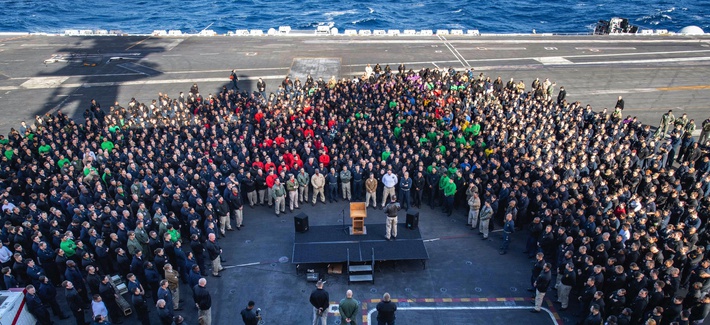
It is widely anticipated that Admiral Michael M. Gilday, the chief of naval operations, will soon – perhaps as early as this week — decide what the fate of Captain Brett Crozier, the commander of the ill-fated Theodore Roosevelt, will be.
Navy Captain Crozier was removed from command by the (former) Acting Secretary of the Navy after Crozier pled for assistance in evacuating his coronavirus-exposed sailors off the ship and into quarantine and was subsequently denigrated, called “too stupid to be a commanding officer” of the Roosevelt, even accused of “betrayal,” by the same (former) Acting Secretary of the Navy.
Gilday, “known as an honest, straight shooter, is expected to make a decision based on the facts and his judgment of what is best for the ship’s crew and the Navy,” write Lolita C. Baldor and Robert Burns in a recent analysis of what the decision could be.
According to their analysis, Gilday has several choices. Among them:
• Reinstatement
“Gilday could decide that Crozier acted in the best interests of his crew and was unfairly removed. He could reinstate him as captain of the Roosevelt.”
But reinstating Crozier has its problems, the authors point out: “It would put him back on a ship with Rear Adm. Stuart Baker, commander of the carrier strike group…they did not have a good relationship…putting them back together would exacerbate the ship’s toxic command climate.”
• Forgive and Move On
“…Gilday could absolve him of wrongdoing and recommend he move on to another job. Crozier could retain his rank and standing and perhaps command another ship, leaving open the possibility that he could gain promotion and continue his Navy career.”
• Administrative Actions
“Gilday could fault Crozier for doing the right thing the wrong way…He could put a letter in Crozier’s personnel file, which usually is a career-ender…”
Finally, “Gilday could determine that firing Crozier was appropriate.” “Unless that’s overturned in an appeal process, that would end Crozier’s Navy career. In most cases, senior officers simply retire after being relieved of command for cause.”
But, Baldor and Burns add, “Gilday could also decide that the ship’s problems extended beyond Crozier. He could recommend that Baker be fired or punished for not being receptive to Crozier’s concerns…Gilday’s review could also dole out criticism for leaders who may have taken too long to recognize the Roosevelt’s outbreak as the deadly problem it became….”
And then, there are the inevitable “politics.” The authors point to the “fraught political environment in Washington that has taken a toll on the Navy,” such as, most recently, Trump’s interference in the war crimes case of former Navy SEAL Eddie Gallagher.
Trump could interfere again, before, during or after Gilday’s decision makes it past acting Navy Secretary James McPherson, Defense Secretary Mark Esper, members of Congress…
Stay tuned. As Trump says, “We’ll see what happens.”
















